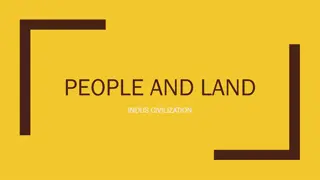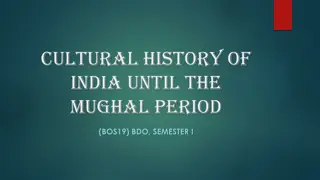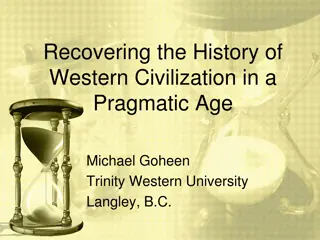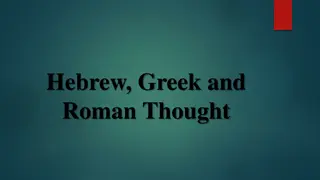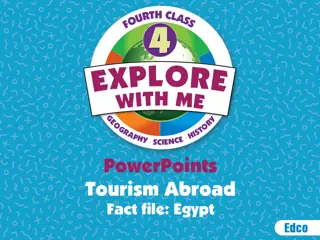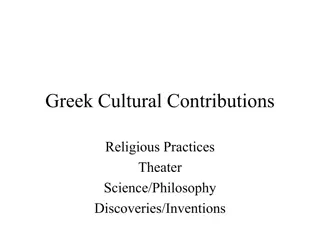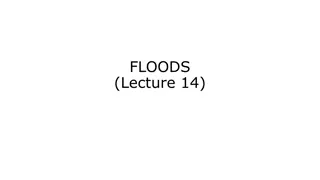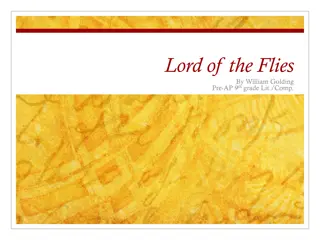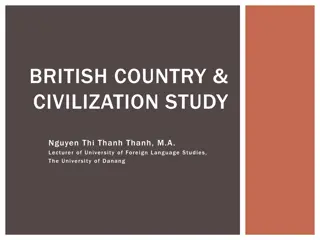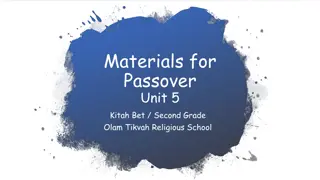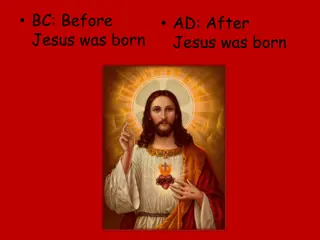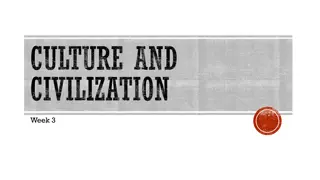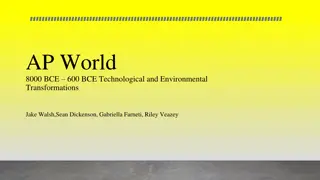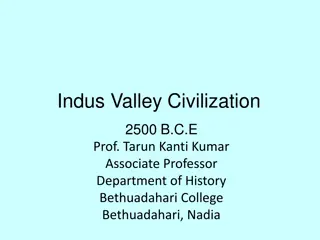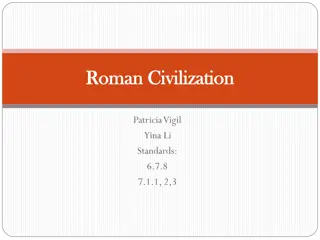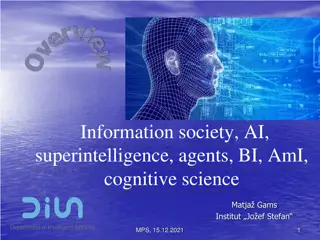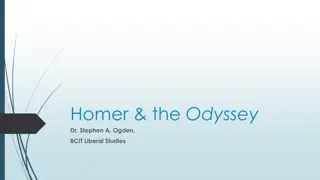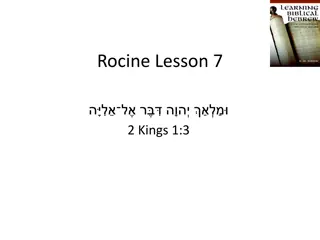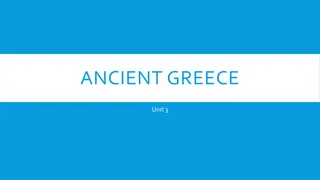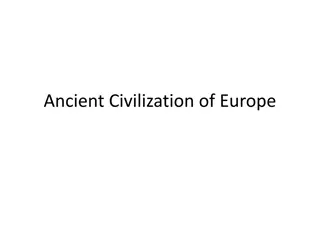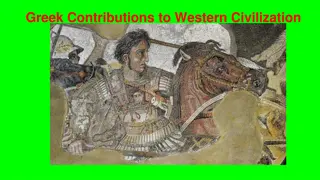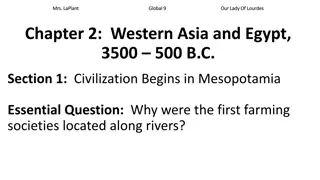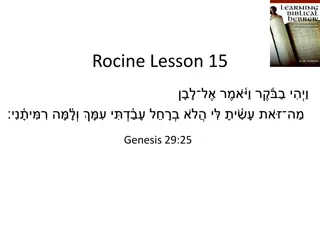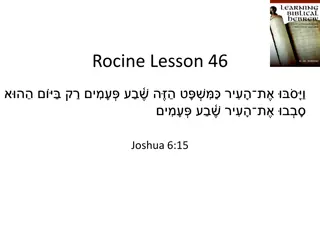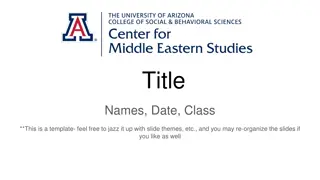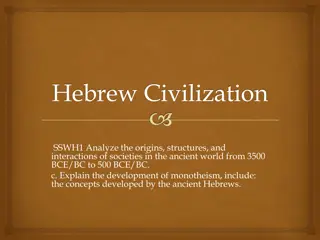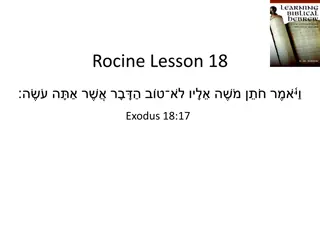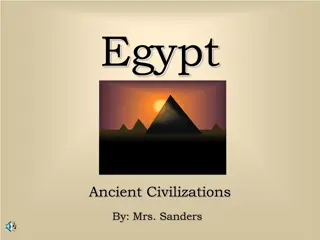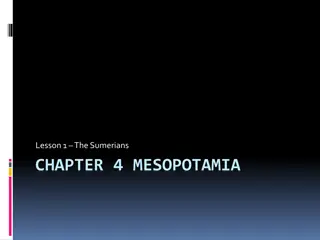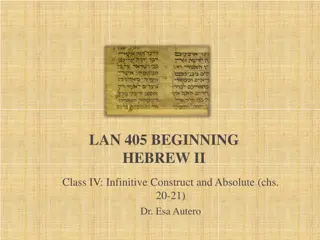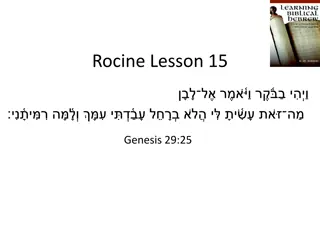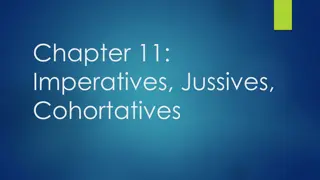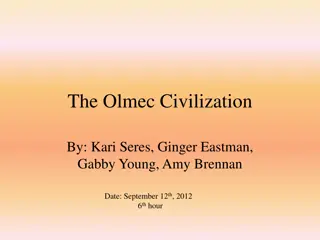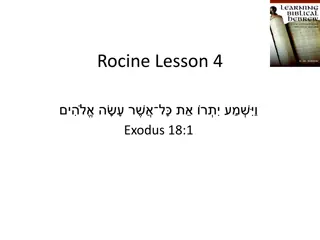Ancient Civilization of the Indus Valley: People, Land, and Culture
The ancient Indus Valley Civilization, one of the oldest in the world, flourished in the region irrigated by the River Indus and its tributaries. Discoveries in places like Mohenjo-Daro and Harappa reveal a sophisticated urban society with advancements in crafts, trade relations with contemporary ci
1 views • 15 slides
Cultural History of India: Early Vedic Period and Aryans
The period of the Aryans in ancient India marked a transition from the Indus Valley Civilization to the Vedic Civilization. The Aryans, possibly migrants from various regions, integrated with the indigenous Dravidians to form the Vedic society. Their culture, as depicted in the Vedas and epics like
0 views • 10 slides
Uncovering the Significance of Western Civilization in a Pragmatic Era
Unveil the importance of history in Western civilization amidst a pragmatic age, exploring the impact of cultural formation, religious beliefs, and the mission to modernity. Delve into how studying history provides intellectual growth and understanding of our societal roots and beliefs.
4 views • 34 slides
Hebrew, Greek, and Roman Thought: An Overview
Hebrew civilization, with its roots dating back to 2500 B.C., intertwines various economic, political, ethical, and philosophical ideas. The Hebrews held unique beliefs on topics such as usury, commerce, labor, agriculture, and money, which shaped their societal structure and values.
1 views • 34 slides
Explore the Fascinating Wonders of Egypt's Ancient Civilization
Egypt, with Cairo as its capital, is a captivating destination in Africa with a population of 100 million. Arabic is the official language, and the currency is the Egyptian pound. Its hot, dry summers and mild winters attract millions of tourists yearly who come to experience its rich culture and hi
5 views • 16 slides
Greek Cultural Contributions: From Olympics to Theater
Ancient Greek civilization made significant cultural contributions in various aspects such as religious practices, theater, and scientific discoveries. The Greeks had a rich tradition of honoring their gods through events like the Olympics and theatrical performances that continue to fascinate audie
4 views • 26 slides
Ancient Flood Narratives: Sumerian, Babylonian, and Hebrew Accounts
Ancient flood narratives from Sumerian, Babylonian, and Hebrew sources depict stories of divine displeasure, flood planning, and survival through boat-building. Enlil, Enki, and Yahweh play key roles in warning individuals like Uta-napishtim, Atrahasis, and Noah to build boats and save life forms du
0 views • 8 slides
Exploring the Depths of "Lord of the Flies" by William Golding
William Golding’s "Lord of the Flies" is a powerful allegorical novel that delves into human nature, society, and the struggle between civilization and savagery. Set in the aftermath of WWII, the story follows a group of boys stranded on an uninhabited island, each representing different facets of
0 views • 12 slides
British Country & Civilization Study: Government and Constitution Overview
The British Country & Civilization Study covers various aspects of the United Kingdom, including its government structure, constitution, history, education, and holidays. The UK is a parliamentary democracy with a constitutional monarchy, where the relationship between the State and the people relie
1 views • 41 slides
Exploring Passover: Symbolism of Spring and Jewish Calendar Insights
Learn about the Festival of Spring in Israel and the symbolism of Passover, commemorating the Israelites' exodus from Egypt. Discover the significance of Passover occurring in the spring and how the Hebrew calendar's lunar nature affects holiday seasonality. Explore Hebrew language connections to th
2 views • 11 slides
Exploring Roman Civilization: Contributions and Daily Life
Delve into the intriguing world of ancient Rome through a visual journey showcasing the impact of Roman civilization. Discover the architecture, art, infrastructure like roads and drains, calendar systems, coins, and the luxurious baths they enjoyed. Uncover the influence of the Roman Empire on vari
0 views • 20 slides
Exploring Culture, Civilization, and Tradition Through Matthew Arnold's Perspective
Delve into the intricate relationship between culture, civilization, and tradition, as perceived through the teachings of Matthew Arnold. Unveil the essence of what constitutes a cultured individual and a civilized society, while navigating the challenges posed by shifting societal dynamics. Arnold'
0 views • 12 slides
The Story of Jochebed: A Vigorous and Courageous Woman
Jochebed, a Hebrew woman, displayed incredible strength and courage in defying Pharaoh's cruel orders to kill newborn Hebrew boys. She, along with other midwives, saved many lives by fearlessly protecting the male infants. Despite challenging circumstances, Jochebed's love for her children and selfl
0 views • 24 slides
Hebrew Language Learning Chants and Grammar Review
Explore a variety of Hebrew language learning chants and grammar concepts through visual aids and mnemonics. From reviewing verb conjugations to understanding noun genders and personal pronouns, dive into the world of Hebrew language with engaging chants and illustrations.
1 views • 13 slides
Early Human Civilization: Technological and Cultural Transformations
The transition from the Neolithic Revolution to the Bronze Age marked significant advancements in agriculture, metalworking, trade, and governance. The Neolithic Revolution brought about permanent settlements and agricultural farming, while the Bronze Age introduced widespread use of bronze and econ
0 views • 7 slides
Exploring the Indus Valley Civilization: Artifacts, Cities, and Origins
Delve into the ancient Indus Valley Civilization, dating back to 2500 B.C.E. Uncover the roots of this civilization, its carefully planned cities such as Harappa and Mohenjo-Daro, and the exquisite artifacts including pottery, metalwork, and small sculptures. Discover the intriguing early trade rout
1 views • 15 slides
Roman Civilization Overview
Roman civilization was influenced by Greek culture, as seen in their art, literature, and architecture. Roman artists and writers borrowed ideas from the Greeks but adapted them to suit their needs. They created realistic statues, innovative buildings with features like arches and domes, and iconic
0 views • 36 slides
Challenges Facing Human Civilization in the Modern Era
The content discusses various potential threats to human civilization, including superintelligence, nuclear war, environmental destruction, and demographic challenges. It highlights concerns such as fast human growth, animal extinction, and the impact on smaller nations within the EU. The implicatio
0 views • 43 slides
The Impact of Homer and The Odyssey on Western Civilization
Homer, the legendary poet behind The Odyssey, played a significant role in shaping Western civilization through his epic writings. The influence of Homer's works transcends time, setting the foundation for Western literature and study. The storytelling style of epic narratives, encompassing myth, hi
0 views • 5 slides
Understanding Construct Chains in Hebrew: A Visual Guide
Explore the concept of construct chains in Hebrew grammar through visual examples and explanations. Learn how to identify, read, and create construct chains using nouns and the word "of." Discover the importance of definite and indefinite status in construct chains with relevant biblical examples. C
0 views • 16 slides
Ancient Greece: History and Civilization Overview
The geographical challenges of Ancient Greece led to the development of distinct communities with unique customs and beliefs. The Minoans and Mycenaeans played significant roles early on, but the Dark Ages followed the collapse of civilization post-Trojan War. Different forms of government emerged,
0 views • 11 slides
Ancient Civilization of Europe: Island of Crete and Greek Culture
Island of Crete played a significant role in the history of Ancient Europe as a cultural bridge between Asia, Africa, and Europe. The civilization on Crete, known for its advanced arts, crafts, and writing, thrived before collapsing in the 15th century BC. The Greeks, located in southeastern Europe,
0 views • 20 slides
Greek Contributions to Western Civilization
Explore the notable contributions of ancient Greece to Western civilization, including the establishment of democracy, development of the alphabet, creation of the first computer, and the origin of the Olympic Games. From democracy and language to technology and sports, the impact of Greek culture r
0 views • 18 slides
Early Civilization in Mesopotamia: Sumerian Contributions and City-States
The early civilization in Mesopotamia, particularly the Sumerians, thrived along rivers due to fertile soil from floods and the ease of irrigation. Belief in multiple gods stemmed from harsh climates. Sumerian contributions spanned political, cultural, and technological realms. City-states played a
0 views • 16 slides
Study of Definite Article and Prepositions in Biblical Hebrew
Explore the identification and reading of the definite article with prepositions, Qal qatal and Piel qatal paradigms, and various questions related to Hebrew grammar. Understand the significance of prepositions with the definite article and learn about verb charts for qatal forms in Biblical Hebrew.
0 views • 25 slides
Understanding Geminate Roots in Biblical Hebrew - Lesson 46 Insights
Explore the nuances of geminate roots in Biblical Hebrew through Lesson 46 insights, focusing on identifying and reading these unique verb forms. Discover how geminates conjugate erratically and learn to translate Qal yiqtol and wayyiqtol phrases, gaining a deeper understanding of their impact on sc
0 views • 20 slides
Exploring the Rich Heritage of the Silk Road Civilization
Dive into the captivating history of the Silk Road civilization through maps, cultural insights, economic facets, and detailed analysis of artifacts from daily and special use categories. Uncover the diverse cultural landscape, economic significance, and manufacturing techniques that shaped this anc
0 views • 18 slides
Development of Monotheism: Ancient Hebrew Civilization Overview
Ancient Hebrew civilization, emerging around 2000 BC in Canaan, played a crucial role in the development of monotheism through Judaism. Influenced by Mesopotamia and Egypt, the Hebrews introduced monotheistic beliefs, as seen in the key features of Judaism such as the Ten Commandments. The Exodus fr
0 views • 7 slides
Challenges of Syntactic Variation in Biblical Hebrew
Linguistic variation in Biblical Hebrew has sparked a heated debate since 2000, challenging traditional dating methods and assumptions. The Structure Debate delves into syntactic variation and the use of the participle, while considering the differing language in Early Biblical Hebrew (EBH) and Late
0 views • 21 slides
Introduction to Biblical Hebrew Vowels: A Comprehensive Overview
Exploring the development and significance of Hebrew vowels in Biblical texts, this visual guide covers the evolution of vowel systems, the roles of the Masoretes in adding vocalization marks, and the distinctions between a-class, e-class, i-class, o-class, and u-class vowels. Delve into the nuances
0 views • 28 slides
Special Issues in Hebrew Cataloging in Alma - Presentation by Yoel Kortick
This presentation by Yoel Kortick, Senior Librarian, delves into cataloging challenges with Hebrew characters in Alma. Learn about the complexities of combining Hebrew and Latin scripts in cataloging fields. Explore issues related to right-to-left justified text, subfield indicators, and more. Gain
0 views • 37 slides
Understanding Hebrew Adjectives: Function and Usage Explained
Explore the functionality and usage of Hebrew adjectives as they can function in three ways - attributive, predicate, and substantive. Learn how they describe nouns, verbs, and function on their own in Hebrew language.
0 views • 33 slides
Unveiling the Remez in Psalm 22:6 - Journey into Hebrew Symbolism
Delve into the mysterious symbolism of Psalm 22:6, exploring the hidden meaning behind the term "worm" and its profound significance in the context of Hebrew scripture and prophetic allusions to the Messiah's sacrifice. Unravel the layers of interpretation, from the traditional Hebrew translations t
0 views • 23 slides
Exploring Ancient Egypt: Pharaohs, Pyramids, and Biblical Connections
Ancient Egypt, a cradle of civilization, thrived along the Nile River for centuries. From the rule of the pharaohs to the architectural marvels of the pyramids, this civilization left a lasting legacy. The biblical connections, such as the story of Joseph and Moses, add depth to Egypt's rich history
1 views • 15 slides
Civilization of Sumer: Mesopotamia's First Urban Society
Mesopotamia, the cradle of civilization, saw the rise of the Sumerians in 3000 BC. Situated between the Tigris and Euphrates rivers, the Sumerians developed advanced city-states, introducing writing, agriculture, and social classes. Their legacy includes innovations in irrigation, city planning, and
0 views • 10 slides
Exploring Hebrew Infinitive Construct and Absolute Forms
Explore the characteristics and forms of infinitive constructs and absolutes in Hebrew, understanding their similarities and differences to English infinitives. Delve into the identification and translations of infinitive construct forms, along with examples of verbal roots in infinitive construct f
0 views • 29 slides
Understanding Hebrew Verb Forms: Qal Qatal and Piel Qatal Paradigms
Explore the rules and nuances of using definite articles with prepositions, verb forms, and verb charts in Hebrew. Learn how to identify and read the Qal Qatal and Piel Qatal paradigms, and understand the significance of prepositions with the definite article. Dive into verb charts for Qatal and dec
0 views • 25 slides
Hebrew Language Learning Resources
Explore various Hebrew language learning resources including imperatives, jussives, cohortatives, songs, greetings, time expressions, and vowel pronunciation. Enhance your understanding of Hebrew through interactive lessons and cultural insights.
0 views • 69 slides
Exploring the Olmec Civilization: Origins, Culture, and Legacy
The Olmec Civilization, considered the mother civilization of Mesoamerica, emerged from competing chiefdoms where rulers served as religious leaders. They thrived in agriculture, building mounds, pyramids, and temples. Their religious practices included mound building, bloodletting, and ritual sacri
0 views • 20 slides
Understanding Dependent Clauses and Verb Forms in Biblical Hebrew
Learn to identify dependent clauses using relative pronouns and read the background of Qal qatal in a Bible study lesson based on Exodus 18:1. Explore the forms of the verbs, subject, and object, along with the pronunciation and translation of specific Hebrew words. Understand the significance of qa
0 views • 33 slides
